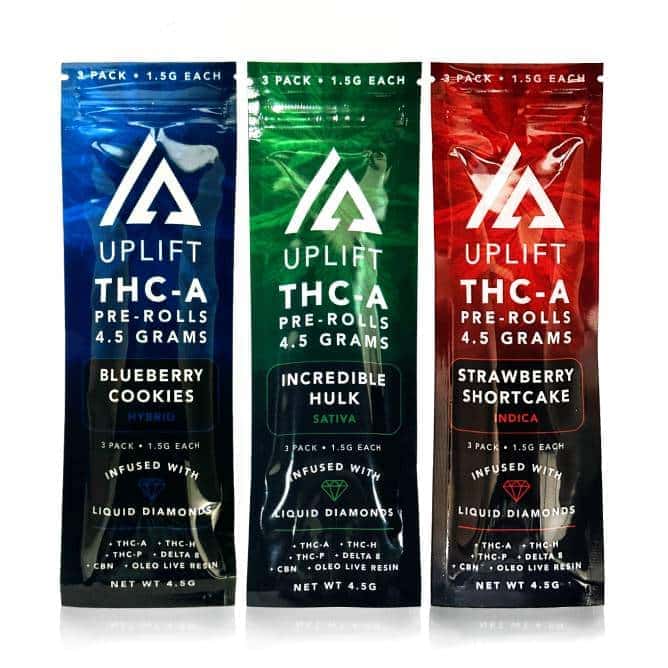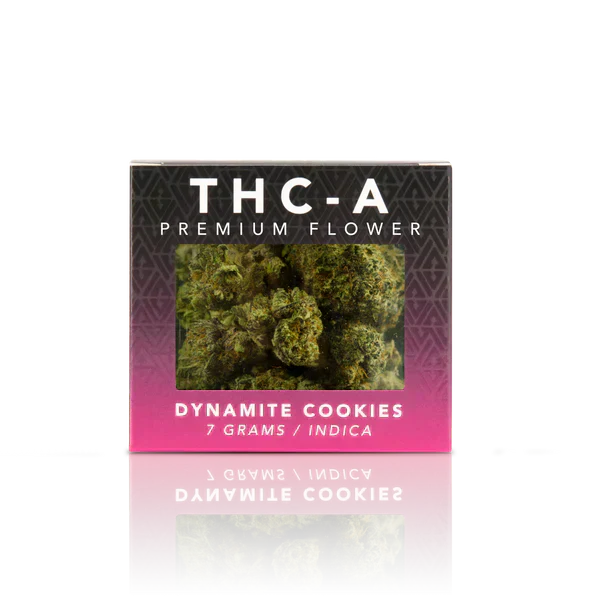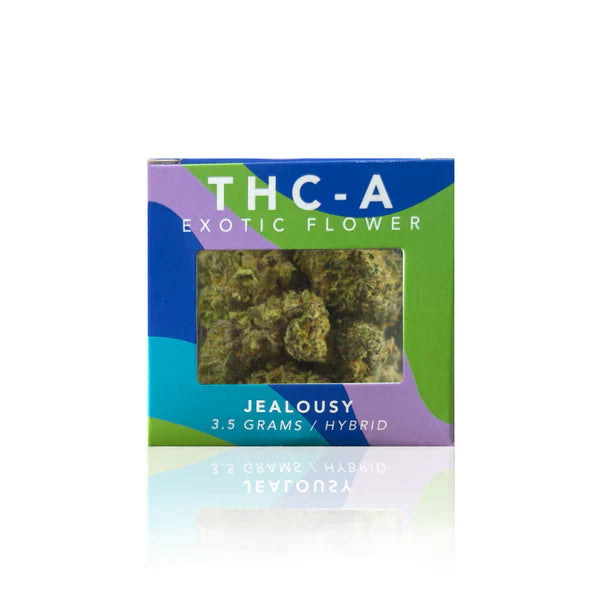Does THCA flower get you high? That’s a question many consumers are starting to ask, as interest in minor cannabinoids gains momentum. Most Popular Knowledge Base Elevated Here at Uplift CBD, we believe that transparency and accurate information are key to helping you make an informed decision. In this piece, we’ll look at where THCA fits in the cannabis plant, when it does and doesn’t make you high, and what it means for people who want medical benefits but don’t want the high.
See for yourself and try our lab-tested THCA Pre Rolls designed for those wanting to know what high-THCA flower is all about without the mystery or fuss.
What Is THCA, And Can It Get You High?
What is THCA? And how does it involve the raw & living cannabis plant? It is also not psychoactive in its raw state the way THC is. That’s because THCA cannot readily bind to the CB1 brain receptors that are responsible for pot’s high.
But when made at heat it, like decarboxylates, which it is change’s form. Heat causes carboxyl a group to be removed from the compound, turning THCA into delta-9 THC the psychoactive form that gets people high, imparting euphoria and a range of other mental and physical effects.
In other words, you’re not going to have a psychedelic experience from THCA unless you’ve heated it. This can be helpful for those interested in testing out specific parts of the plant for medicinal purposes, without the buzz.
Get Yours Now
How Long Does THCA Stay in Your System?
It is important to know for how long the body can retain cannabinoids for both health and legal reasons. Because it doesn’t get you high, THCA is not something that normal drug tests look for, which aim to detect only the byproduct of an active and intoxicating high, unlike THC.
However, once it is metabolized into THC whether deliberately via decarboxylation or accidentally from heat application to its products can be found. Here are the approximate detection windows for THC in your system:
Urine: Up to 30 days with regular, heavy use
Blood: Approximately 36 hours
Saliva: 1 to 3 days
Hair: Up to 90 days
While THCA itself is rarely tested for, users should be aware that conversion into THC—whether during consumption or through improper storage can result in detectable levels.
Does THCA Flower Get You High?
THCA is non-intoxicating on its own. In its natural state, this substance is non-psychoactive, so it won’t get you “high” while taking it in.
But once THCA flower is heated, or decarboxylated, into THC, it will induce psychoactive effects. This is also why the way you ingesting cannabis, whether that’s smoking, vaping, or cooking with it, can drastically impact the experience you have consuming raw cannabis.
Key points to consider:
THCA is non-psychoactive unless heated.
Decarboxylation is the process that activates its psychoactive potential.
Medical users may benefit from THCA’s properties without experiencing intoxication.
This distinction is important to consumer patients who are looking to treat symptoms without getting high, and also sensitive physicians who are considering cannabinoid therapy for their patients.
Methods of Decarboxylating THCA
Those wanting to activate THCA’s psychoactive effects need to understand decarboxylation. Below, here are some of the most popular decarboxylation methods for cannabis:
Oven Heating
Spread ground cannabis on a baking sheet and bake at 220– 245°F for 30 – 45 minutes. This is a common approach that yields expected results.
Boiling in a Sealed Bag
Cannabis is placed in a waterproof, heat-proof bag, then dunked in boiling water. All of this enables a slow decarboxylation with no burning.
Slow Cooker Infusion
Coagulation of cannabis at low heat over a few hours allows slow decarboxylation and is perfect for edibles.
Microwave Heating
This one is faster, but not as accurate. Low doses of heat must be observed closely to prevent heat shock.
Sun Exposure
Long term exposure to sun-light can slowly decarboxylate cannabis, but it’s not very reliable.
All of them have their specific applications according to your end product, but they all hinge on applying heat to transform THCA into THC.
Understanding the Effects of THCA
Many consumers are unaware that THCA offers its own potential health benefits, even in its non-psychoactive form. Research suggests that THCA may possess:
Anti-inflammatory properties
Neuroprotective potential
Anti-nausea and anti-emetic effects
Raw consumption through juicing, tinctures, or topicals provides the therapeutic and preventative effects of cannabis, without the buzz and impaired coordination. Items such as CBD Sleep Gummies can also be used with THCA to promote sleep and recovery, especially for those suffering from chronic inflammation or even pain.
While non-decarbed THCA does not induce a psychoactive high, its healing profile is one that remains worth pursuing in both health and clinical spaces for the time being.
Get Yours Now
What Does High THCA Percentage Mean?
A high percentage of THCA on a cannabis label generally means the product is highly psychoactive when heated. That does not mean the product will get you high, but it does give you an idea of how strong it will be after decarbing.
Consider the following:
Potency Potential: More THCA equals more THC when activated.
Product Labeling: Many shops list THCA for the purpose of helping customers have an understanding of a product's potency.
Quality of Cultivation: Prettier buds with higher THCA content indicate better growing and harvesting methods.
Medical: This information is extremely important for patients who are making oils or edibles for medicinal use.
Knowing where the cannabinoids come from can help people make better informed decisions about what works best for them.
Will THCA Trigger a Positive Drug Test?
There are currently no federal or state guidelines outlining a recommended cutoff for THC in the workplace or in employment drug testing. But there are instances of THCA potentially leading to a positive result:
Exposure to Heat: Had THCA been exposed to heat prior to being tested, some of the compound would have been converted into THC.
Trace THC contamination: Some THCA products may test positive for THC due to processing processes.
Advanced Screening: A special THCA-focused test or extremely sensitive THC test could possibly find its presence, this however would be extremely rare.
If you are in an environment that conducts required drug testing, it is a good idea to discuss with your employer or medical professional prior to using THCA-based products.
Frequently Asked Questions
How long does it take THCA to decarboxylate to THC?
Decarboxylation is extensive for 30–45 minutes at 220–245°F.
Can THCA help with sleep?
Although not directly sedating, its ability to reduce inflammation might help you rest more easily when combined with other cannabinoids like CBD.
Does THCA interact with CBD?
Maybe, and together they may have coordinating benefits in inflammation and pain.
Is it possible to produce THCA at home?
Yes, with the proper oil or alcohol extraction methods, although heat should be avoided to maintain THCA in its raw version.
What THCA products are there?
THCA is available as flower, tinctures, topicals, and crystalline isolates Uplift CBD carries them all and shares every detail with you.
Are there any drug interactions with THCA?
There are currently no known significant interactions, but consult a physician before using in conjunction with other medications.
Is THCA safe for pets?
Only under veterinary supervision. Dosing needs to be exact, and not all animals react to it the same way.
How should THCA be stored?
Store it in a cool, dark, air-tight vessel to avoid spoiling and unintended decarbing.
Final Thoughts
In short, can you get high from THCA flower? Not in its raw form. THCA is non-psychoactive until heated. But when decarboxylated, it changes to THC and can cause the same effects that we associate with the “high.”
Our THCA products at Uplift CBD are great for those who are looking to have options for recreational and medical use. Whether you’re trying to prevent inebriation, or to safely activate your product’s full potential, knowing what THCA does, and how to utilize it is a key to both safe and amazing use of your cannabis.
Contact Uplift CBD today at 727-498-8543 with any questions or to learn more about our THCA and CBD options. We provide safe products across the country with a focus on transparency and education.
Get Yours Now











